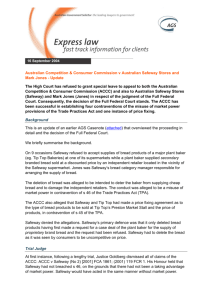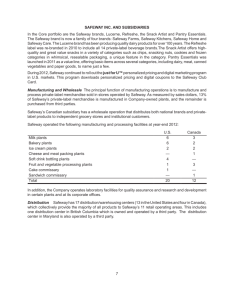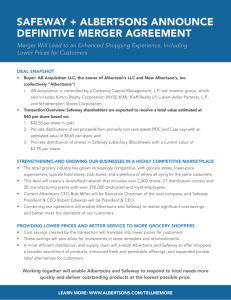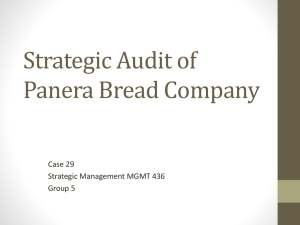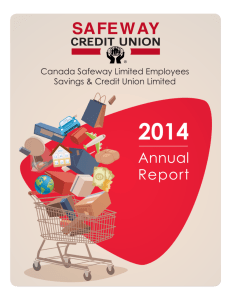AGS Casenote Safeway.pmd - Australian Government Solicitor
advertisement
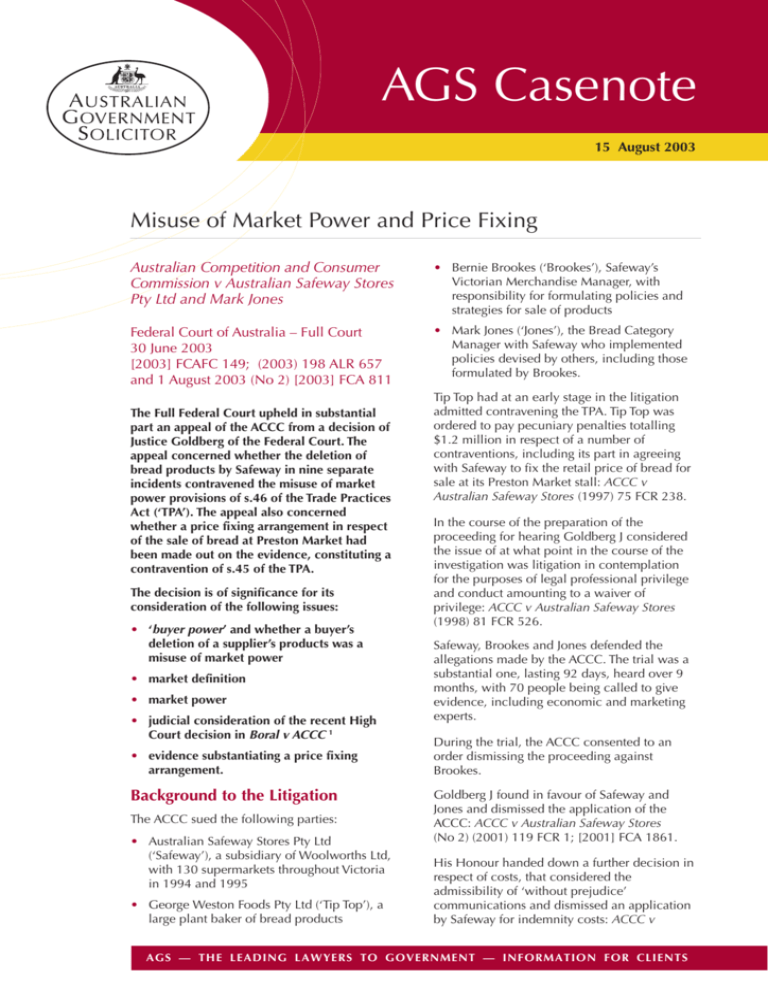
AGS Casenote 15 August 2003 Misuse of Market Power and Price Fixing Australian Competition and Consumer Commission v Australian Safeway Stores Pty Ltd and Mark Jones • Bernie Brookes (‘Brookes’), Safeway’s Victorian Merchandise Manager, with responsibility for formulating policies and strategies for sale of products Federal Court of Australia – Full Court 30 June 2003 [2003] FCAFC 149; (2003) 198 ALR 657 and 1 August 2003 (No 2) [2003] FCA 811 • Mark Jones (‘Jones’), the Bread Category Manager with Safeway who implemented policies devised by others, including those formulated by Brookes. The Full Federal Court upheld in substantial part an appeal of the ACCC from a decision of Justice Goldberg of the Federal Court. The appeal concerned whether the deletion of bread products by Safeway in nine separate incidents contravened the misuse of market power provisions of s.46 of the Trade Practices Act (‘TPA’). The appeal also concerned whether a price fixing arrangement in respect of the sale of bread at Preston Market had been made out on the evidence, constituting a contravention of s.45 of the TPA. The decision is of significance for its consideration of the following issues: • ‘buyer power’ and whether a buyer’s deletion of a supplier’s products was a misuse of market power • market definition • market power • judicial consideration of the recent High Court decision in Boral v ACCC 1 • evidence substantiating a price fixing arrangement. Background to the Litigation The ACCC sued the following parties: • Australian Safeway Stores Pty Ltd (‘Safeway’), a subsidiary of Woolworths Ltd, with 130 supermarkets throughout Victoria in 1994 and 1995 • George Weston Foods Pty Ltd (‘Tip Top’), a large plant baker of bread products Tip Top had at an early stage in the litigation admitted contravening the TPA. Tip Top was ordered to pay pecuniary penalties totalling $1.2 million in respect of a number of contraventions, including its part in agreeing with Safeway to fix the retail price of bread for sale at its Preston Market stall: ACCC v Australian Safeway Stores (1997) 75 FCR 238. In the course of the preparation of the proceeding for hearing Goldberg J considered the issue of at what point in the course of the investigation was litigation in contemplation for the purposes of legal professional privilege and conduct amounting to a waiver of privilege: ACCC v Australian Safeway Stores (1998) 81 FCR 526. Safeway, Brookes and Jones defended the allegations made by the ACCC. The trial was a substantial one, lasting 92 days, heard over 9 months, with 70 people being called to give evidence, including economic and marketing experts. During the trial, the ACCC consented to an order dismissing the proceeding against Brookes. Goldberg J found in favour of Safeway and Jones and dismissed the application of the ACCC: ACCC v Australian Safeway Stores (No 2) (2001) 119 FCR 1; [2001] FCA 1861. His Honour handed down a further decision in respect of costs, that considered the admissibility of ‘without prejudice’ communications and dismissed an application by Safeway for indemnity costs: ACCC v AGS — THE LEADING LAWYERS TO GOVERNMENT — INFORMATION FOR CLIENTS Australian Safeway Stores (No 3) (2002) ATPR 41-901. be charged and the type of bread to be sold by Tip Top at its Preston Market stall. The ACCC appealed to the Full Federal Court (Heerey, Sackville and Emmett JJ). The Full Court has substantially upheld the appeal. The Full Court’s substantive reasons were delivered on 30 June 2003. The Full Court handed down a further judgment on 1 August 2003, that made detailed orders and awarded the ACCC 80 per cent of its costs of the appeal. The proceeding has been remitted to the trial judge for further determination. Contraventions The summary set out below is necessarily a brief overview of complex facts, legal claims and defences and extensive reasons of the trial judge and of the Full Federal Court. Facts The litigation concerned events that took place in 1994 and 1995 in Victoria. Bread was produced by three major plant bakers, Tip Top, Buttercup and Sunicrust (‘the plant bakers’). They supplied 80 per cent of all plant baked bread for retail sale. Safeway was the largest purchaser in Victoria. Bread was also manufactured by independent bakers and hot bread shops for retail sale. Bread was found to be a significant product for a supermarket, being not only a staple food, but also indicative of a retailer’s general price competitiveness. There were different categories of bread made by the plant bakers. Proprietary bread, sold under a brand name and heavily promoted, and secondary bread, sold with little or no advertising. The ACCC alleged that Safeway had a policy that if secondary branded bread of a plant baker was on special with another retailer (other than Coles or Franklins) in the vicinity of a Safeway store, at a price less than Safeway, then Safeway would remove all that plant baker’s bread from sale while that product was on special at the independent retailers store (‘the bread policy’). The bread policy was implemented in nine incidents (‘the nine incidents’), in which Safeway sought to deter plant bakers from supplying cheap secondary bread to independent retailers. A further incident (‘the Preston Market incident’) concerned an allegation that Safeway, through Brookes and Jones, had made an arrangement with Tip Top as to the prices to Nine incidents In the nine incidents, the Commission alleged that Safeway had either attempted or had: • made an arrangement with the plant bakers that the bakers cease supplying cheap secondary bread to independent retailers with the purpose of lessening competition: contravention of s.45 • taken advantage of its market power in the wholesale market for the acquisition of bread with the purpose of imposing a term of trade on plant bakers that they would not supply cheap secondary bread to independent retailers and to deny the retailers access to cheap secondary bread thereby preventing them undercutting Safeway: contravention of s.46 • engaged in exclusive dealing: contravention of s.47 • induced the plant bakers to engage in retail price maintenance (‘RPM’): contravention of s.48. Preston Market incident It was alleged that the Respondents had made, and given effect to, an arrangement regarding the prices Tip Top would charge for its secondary bread at the Preston Market stall, that substantially lessened competition: contravention of s.45(2). Section 45A deems price fixing arrangements to substantially lessen competition. It was also alleged that the arrangement included an exclusionary provision, that proprietary bread not be sold at the stall: contravention of s.45(2). The conduct was further alleged to constitute exclusive dealing, in contravention of s.47. Safeway’s defences In defending the allegations made by ACCC, Safeway and Jones: • Argued that the bread policy alleged by ACCC was incorrect and that Safeway’s true bread policy, as formulated by Brookes, was intended to place Safeway in a competitive position and involved making a request for a case deal (i.e. provision of bread at a discount) prior to a deletion of bread 2 occurring, in order to be price competitive with independent retailers (‘the Brookes bread policy’). • Contested the ACCC’s market definition and denied it had market power. • Argued that no anti-competitive arrangements were made. This Casenote concentrates on the decisions of the Court in respect of price fixing (s.45) and misuse of market power (s.46). Decision of the Trial Judge Nine incidents Goldberg J dismissed the claims of the ACCC that the conduct in respect of the nine incidents constituted price fixing, misuse of market power, exclusive dealing and RPM. Price fixing arrangement (Section 45) Goldberg J stated that in order for there to be a price fixing arrangement there had to be a meeting of minds of the parties. Jones’ requests for a case deal were a unilateral act, which if declined resulted in the deletion of a plant baker’s products. The evidence did not support the conclusion that there had been a meeting of minds between Safeway and any of the plant bakers. Misuse of market power (Section 46) Market definition Goldberg J upheld the ACCC’s contention that the relevant market in which Safeway had a substantial degree of market power was the wholesale market for the acquisition of bread in Victoria. Safeway had submitted that the relevant market was the total bread market at both wholesale and retail levels, which included hot bread shops and independent bakers. Market power The High Court has held in Queensland Wire 2 and Melway 3 that ‘market power’ exists where a firm can behave persistently in a manner different from how it would be forced to act in a competitive market (i.e. unconstrained by the conduct of competitors). Goldberg J held that Safeway possessed market power as an acquirer of bread at the wholesale level from plant bakers in Victoria, by reason of the following considerations: • Safeway had the ability to influence the terms of trade on which plant bakers dealt with it to an extent it could not do so in a competitive market. The evidence was that Safeway always bought at the best price. • Safeway was the largest purchaser of bread products from the plant bakers. • Safeway was not constrained by barriers to entry. • The plant bakers had excess production capacity. • If Safeway significantly reduced its purchases of bread from plant bakers the plant bakers had no alternative large-scale purchasers of bread. • Hot bread shops were in the retail market and did not constrain Safeway’s power in the wholesale market. • Independent bakers were not a viable alternative source of supply for independent retailers seeking cheap bread. Take advantage of market power The expression ‘take advantage of’ means to ‘use’ the market power involved: Queensland Wire. There is a use of market power by a firm where it does something that is materially facilitated by the existence of the power: Melway. Goldberg J held that Safeway did not take advantage of its market power in any of the nine incidents by deleting bread, as it would have acted in the same manner in a competitive market without market power. Purpose Goldberg J found that the policy that Safeway had was in terms claimed by Safeway (the Brookes bread policy) and not that alleged by the ACCC. The purpose of the Brookes bread policy was to enable Safeway to be competitive and was not intended to prevent or deter plant bakers from engaging in competitive conduct with independent retailers. There had been a request for a case deal before a deletion occurred in five incidents. In two incidents, Goldberg J could not make a finding. The making of a request for a case deal was considered to be inconsistent with the purpose to punish plant bakers. Accordingly, no proscribed purpose existed in seven of the incidents. In the remaining two incidents, Goldberg J found that no requests for a case deal had been made prior to a deletion taking place and that 3 Safeway’s purpose was to punish the plant baker. However, no contravention occurred in these two incidents, by reason of Goldberg J’s ruling that Safeway had not taken advantage of its market power. Exclusive dealing (Section 47) Goldberg J held that sub-sections 47(4) and (5) do not apply to conditions on the acquisition of goods that relate to the price of goods. Retail price maintenance (Section 48) On the evidence, Brookes and Jones did not intend to have the plant bakers engage in RPM and Safeway did specify a price or range of prices for there to be RPM. Preston Market incident Although there had been discussions between officers of Safeway and Tip Top relating to Preston Market and prices of bread, Goldberg J was not satisfied that an arrangement had been entered into between persons with authority to act on behalf of Safeway. Accordingly, Goldberg J dismissed the case in respect of the Preston Market incident. The ACCC appealed against the dismissal of the claims made in respect of misuse of market power and the Preston Market incident. Full Federal Court decision on appeal Nine Incidents Misuse of market power (Section 46) The Full Court was divided as to whether there had been a contravention of s.46. Heerey and Sackville JJ Market definition Justices Heerey and Sackville upheld Goldberg J’s rulings in respect of market definition. Competition in the retail market for bread did not constrain Safeway’s ability to impose terms of trade on suppliers in the wholesale market. The wholesale and retail markets for bread products were separate markets. Market power This is the first case to consider s.46 in the context of buyer power (monopsony power). The Full Court held that s.46 applies to buyer power, and is concerned with the extent a buyer’s conduct is constrained by competitors, suppliers and customers. Market power on the part of a buyer may be evidenced by the buyer’s ability to extract terms relating to price or terms of trade that are more favourable to itself than it could extract in a competitive market. Safeway was found to have market power by reason of the following factors: • the excess capacity of the plant bakers, combined with Safeway’s substantial market share and its importance to the three plant bakers • Safeway’s conduct in deleting a plant baker’s entire range of bread • barriers to entry were high, requiring entry on a state-wide basis • Safeway was successful in having Tip Top cease supplying cheap bread • Safeway procured an increase in its rival’s costs of supply of bread • Buttercup and Sunicrust suffered loss of sales in having products deleted. Take advantage of market power Their Honours found that Goldberg J was in error in his interpretation and application of the legal principles concerning the term ‘take advantage’ of market power. The rationale for the conduct is critical. … A firm without market power would not have pursued a policy of deletion because to do so would have produced harm for itself without any countervailing benefit. [329] and [330] Heerey and Sackville JJ held that in the four incidents where no requests for a case deal were made, Safeway had taken advantage of its market power in the wholesale market. There was no business rationale for the conduct. It was only explicable as the use of market power to deter the plant baker from supplying independent retailers with cheap secondary bread. Purpose Purpose is to be analysed by reference to Safeway’s conduct and inferences from that conduct, not by ascertaining Brooke’s policy. The deletions in the four incidents could not have occurred by accident. The deletion in those incidents were found to be for the purpose of deterring both the plant bakers and 4 independent retailers from engaging in competitive conduct. Emmett J Justice Emmett agreed with the decision of Heerey and Sackville JJ, except on the issue of market power. His Honour held that he was not persuaded that Safeway had a substantial degree of power as an acquirer of bread market in the wholesale market. The factors that the trial judge relied upon did not establish that Safeway had market power in the wholesale market. For instance, Safeway was not able to obtain better terms of trade than other market participants and barriers to entry were low, being at the local supermarket level. Further, there was evidence that Safeway did not have market power. Safeway was unsuccessful in obtaining case deals from the plant bakers, two plant bakers did stop supplying independent retailers and Safeway could not affect the terms of supply of bread to its rivals, notably Coles or Franklins, or the terms of trade throughout the wholesale market. The trial judge did not identify any conduct by Safeway that was different from conduct expected in a competitive market. Safeway was only successful in causing one plant baker (Tip Top) to change its behaviour with respect to the supply of bread to its competitors, which suggested a degree of power on the part of Safeway. This was insufficient to constitute the requisite substantial degree of power required by s.46 (i.e. the power to influence the market). Preston Market incident, price fixing arrangement – Section 45 The Full Court unanimously held that on the facts as found by Goldberg J, it was satisfied that Jones, who held the requisite authority to bind Safeway, was involved in giving instructions regarding meetings with officers of Tip Top and approved the outcomes. There was a meeting of minds between the participants involved in this incident. The trial judge was in error by applying the Briginshaw standard too rigorously. The ACCC made out its case that Safeway engaged in price fixing by making an arrangement having the purpose or effect of substantially lessening competition. Applications for special leave to appeal have been file with the High Court by the ACCC and also by Safeway and Jones. Accordingly, the High Court may give further consideration to the interpretation of the misuse of market power provisions of the TPA. Text of the decisions is available at <http:// www.austlii.edu.au/au/cases/cth/FCAFC/2003/ 149.html> and <http://www.austlii.edu.au/au/ cases/cth/FCAFC/2003/163.html> Notes 1 (2003) 77 ALJR 623; 195 ALR 609 2 Queensland Wire Industries Pty Ltd v The Broken Hill Proprietary Co Ltd (1989) 167 CLR 177 3 Melway Publishing Pty Ltd v Robert Hicks Pty Ltd (2001) 205 CLR 1 For further information about the decision please contact: Graham Thorley, Senior Executive Lawyer AGS Melbourne Tel: (03) 9242 1244 Fax: (03) 9242 1278 E-mail: graham.thorley@ags.gov.au Canberra Tony Burslem (02) 6243 1289 New South Wales Marcus Bezzi (02) 9581 7470 Victoria Susan Pryde (03) 9242 1426 Queensland Glenn Owbridge (07) 3360 5654 Western Australia Graeme Windsor (08) 9268 1102 South Australia Sarah Court (08) 8205 4231 The material in this casenote is provided for general information only and should not be relied upon for the purpose of a particular matter. Please contact Australian Government Solicitor before any action or decision is taken on the basis of any of the material in this casenote. OFFICES IN CANBERRA, SYDNEY, MELBOURNE, BRISBANE, PERTH, ADELAIDE, DARWIN, HOBART 5
